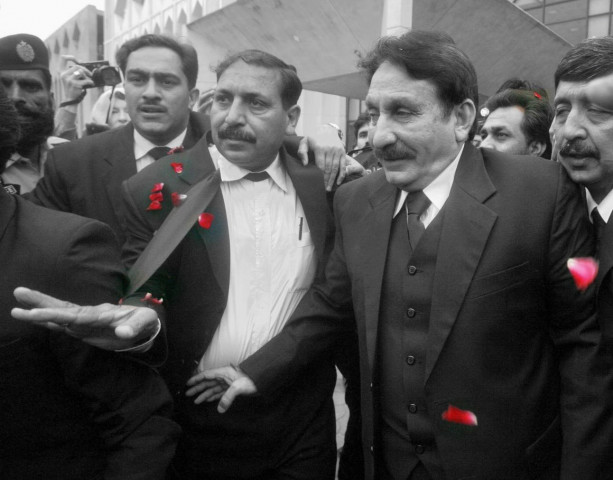The turbulent term of Justice Chaudhry
The pattern set by Justice Chaudry is, however, unlikely to be replicated and perhaps, for this we should be grateful.

File photo of Chief Justice Iftikhar Muhammad Chaudhry. PHOTO: REUTERS/FILE
Accused of ‘judicial overreach’ and an eye for attention, Justice Chaudhry certainly, from the bench, gave down a number of verdicts that served people well. The cases of missing persons and of mafias running Karachi rose from beneath the surface to greater public prominence because they were taken up by the apex Court. He also deserves praise for raising transgenders to the status of citizens with equal rights to all others, demanding legislation to protect acid burn victims and advocating for the under-privileged in other matters. The Supreme Court (SC), however, stepped into far murkier waters with its July 2009 order dismissing nearly 100 judges and in fact, doing just what the judiciary had criticised General (retd)Musharraf for and in the process, made its point about the manner in which judges could be thrown out of office. The same held true with the SC verdict in the complex and dubious matter of the Memo case and also the NRO. The disqualification of Prime Minister Yousaf Raza Gilani for contempt of court will, too, stand out as a moment in history where the role of the court can be called into question for more reasons than one.
All this then leaves behind an era which saw immense turbulence and almost constant tumult. The role of the Court assumed centre stage in national affairs and many would argue this is not the way things should be at all. What happens next is not something we can predict. The pattern set by Justice Chaudry is, however, unlikely to be replicated and perhaps, for this we should be grateful. What we need most of all in our country is institutions able and willing to function within the terms mandated for them by the Constitution and clearly laid down in this document. Problems arise each time these lines are crossed. This has happened too often in the past. As we see Justice Chaudry retire from office, we must hope for a change and a time when order is restored in all matters and things run as they should without intervention from one wing of the state in others. The growing tendency to intervene in the matters of appointments, economic decisions and even the micro management of affairs at a ministerial level has probably inflicted a great deal of harm. This will have to be undone over time and the confusion created over the precise role of the judiciary cleared up in the minds of people. At present, too much haze exists, with some extolling Justice Chaudhry as a hero while others see him as a villain out only to gain recognition and applause for himself.
The truth probably lies somewhere in between. But what is important is that we take some time to look back on the past, all that happened during it notably after 2007, and assess what this means for our country.
We certainly need an independent judiciary. But we must ask ourselves if Justice Chaudry really helped create such a body in any way or whether he did more damage than good by altering the contours within which it functions and thereby leaving behind a situation which will now need to be cleared up to guarantee a safe and stable future for our country and all its people. This can only happen if every institution stays within its given set of boundaries.
Published in The Express Tribune, December 12th, 2013.
Like Opinion & Editorial on Facebook, follow @ETOpEd on Twitter to receive all updates on all our daily pieces.



















COMMENTS
Comments are moderated and generally will be posted if they are on-topic and not abusive.
For more information, please see our Comments FAQ